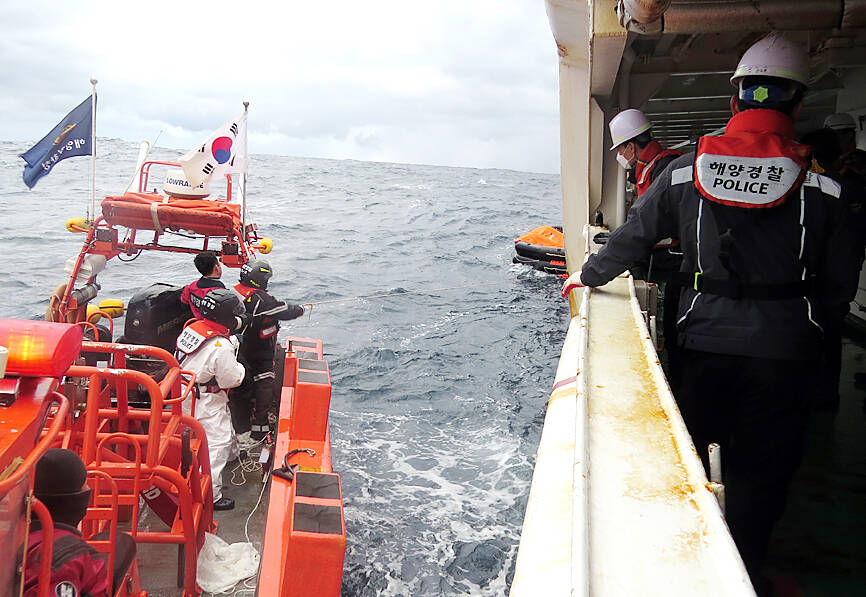Two crew members were confirmed dead and nine others were missing yesterday after their cargo ship sank in rough waters between Japan and South Korea, Japanese authorities said.
Coast guards from the two countries, joined by military aircraft and a private vessel, located 13 of the 22 people who were onboard the Hong Kong-registered Jin Tian, a Japan Coast Guard official said.
However, Japanese medical authorities later confirmed two of those retrieved were dead, the official said.

Photo: EPA-EFE
Six of the rescued crew members remained unconscious, while five were conscious, a Reuters report quoting Kyodo News Agency said.
The crew were from China and Myanmar, but the precise identities of the dead, rescued and missing remained unclear, he said.
“Our vessels will remain in the area and will continue the search operation throughout the night,” he added.
The 6,651-tonne Jin Tian sent a distress signal late on Tuesday evening from a position about 110km west of the remote and uninhabited Danjo Islands in far southwestern Japan.
Three private ships were in the area and helped pick up five of the stranded crew members, the Japan Coast Guard said.
Multiple vessels and aircraft from Japan’s coast guard and military, as well as the South Korean coast guard and a private ship, were involved in the search operation.
The ship’s captain used a satellite phone to tell South Korean coast guard officials that he and the crew would abandon the sinking ship in the early hours of yesterday morning, the Jeju Coast Guard said.
Contact with the crew was then lost.
The accident came as a cold snap hit much of Asia, with daytime temperatures in some of Japan’s islands nearest the rescue site reaching just 3oC.

NO HUMAN ERROR: After the incident, the Coast Guard Administration said it would obtain uncrewed aerial vehicles and vessels to boost its detection capacity Authorities would improve border control to prevent unlawful entry into Taiwan’s waters and safeguard national security, the Mainland Affairs Council (MAC) said yesterday after a Chinese man reached the nation’s coast on an inflatable boat, saying he “defected to freedom.” The man was found on a rubber boat when he was about to set foot on Taiwan at the estuary of Houkeng River (後坑溪) near Taiping Borough (太平) in New Taipei City’s Linkou District (林口), authorities said. The Coast Guard Administration’s (CGA) northern branch said it received a report at 6:30am yesterday morning from the New Taipei City Fire Department about a

IN BEIJING’S FAVOR: A China Coast Guard spokesperson said that the Chinese maritime police would continue to carry out law enforcement activities in waters it claims The Philippines withdrew its coast guard vessel from a South China Sea shoal that has recently been at the center of tensions with Beijing. BRP Teresa Magbanua “was compelled to return to port” from Sabina Shoal (Xianbin Shoal, 仙濱暗沙) due to bad weather, depleted supplies and the need to evacuate personnel requiring medical care, the Philippine Coast Guard (PCG) spokesman Jay Tarriela said yesterday in a post on X. The Philippine vessel “will be in tiptop shape to resume her mission” after it has been resupplied and repaired, Philippine Executive Secretary Lucas Bersamin, who heads the nation’s maritime council, said

REGIONAL STABILITY: Taipei thanked the Biden administration for authorizing its 16th sale of military goods and services to uphold Taiwan’s defense and safety The US Department of State has approved the sale of US$228 million of military goods and services to Taiwan, the US Department of Defense said on Monday. The state department “made a determination approving a possible Foreign Military Sale” to the Taipei Economic and Cultural Representative Office in the US for “return, repair and reshipment of spare parts and related equipment,” the defense department’s Defense Security Cooperation Agency said in a news release. Taiwan had requested the purchase of items and services which include the “return, repair and reshipment of classified and unclassified spare parts for aircraft and related equipment; US Government

More than 500 people on Saturday marched in New York in support of Taiwan’s entry to the UN, significantly more people than previous years. The march, coinciding with the ongoing 79th session of the UN General Assembly, comes close on the heels of growing international discourse regarding the meaning of UN Resolution 2758. Resolution 2758, adopted by the UN General Assembly in 1971, recognizes the People’s Republic of China (PRC) as the “only lawful representative of China.” It resulted in the Republic of China (ROC) losing its seat at the UN to the PRC. Taiwan has since been excluded from